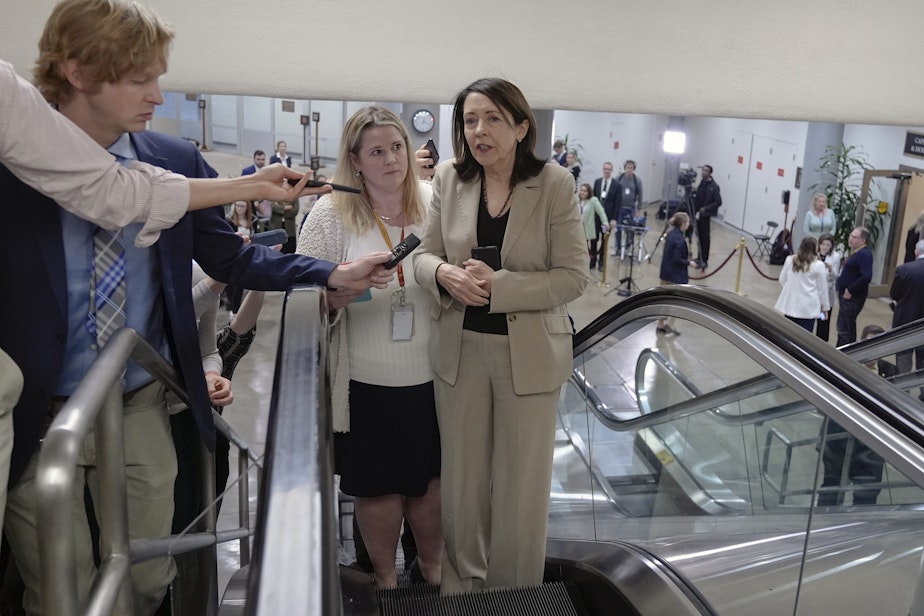As internet privacy law advances, questions raised about Senator Cantwell’s powerful role

The Washington Post published an article recently with a provocative headline: "This Senator wants an online privacy law. She's slowed efforts for years." The reference is to Washington Democratic Maria Cantwell. Along with Republican Rep. Cathy McMorris Rodgers, Cantwell announced a bipartisan effort last week to pass an internet privacy law.
The Post’s tech policy reporter Cristiano Lima-Strong told KUOW’s Kim Malcolm about his reporting.
This interview has been edited for clarity.
Kim Malcolm: You say that Cantwell campaigned on the idea of giving people privacy on the internet, but that she's actually slowed down those efforts to get legislation for quite some time. What do you mean?
Cristiano Lima-Strong: Cantwell came into a really pivotal role as the top Democrat on the Senate Commerce Committee just about five years ago. And since then, that's when a lot of these privacy negotiations on Capitol Hill have picked up. Europe set some of its own rules, as have states like California.
But I've spoken to over a dozen current and former congressional aides who said that Senator Cantwell has been one of the biggest roadblocks to actually getting a law on the books in the US, because she has at times been unwilling, or refused to iron out key disputes, even as other bipartisan groups of lawmakers have sought to strike compromises, and has at times criticized other lawmakers efforts and refused to engage. There have been frustrations building for years on Capitol Hill about her ability to break through some of those disagreements.
A spokesperson for Cantwell says that the bills have not advanced because they didn't offer strong enough protections. How does that line up with your reporting?
Sponsored
Senator Cantwell has said that some past proposals did not have protections that she views as particularly key. One thing that she has insisted on for years has been that there needs to be stronger protections against companies using forced arbitration to try to settle privacy disputes. But I spoke to a number of aides who have said that the contours of these proposals have existed for years.
And there was broad agreement last Congress on one proposal that, in many ways did not advance because Senator Cantwell wanted to hold out for this particular protection. So, a lot of folks on Capitol Hill feel that in some regard, she's let perhaps the perfect be the enemy of the very good in that there has been broad agreement around what this framework should look like, but that in being unable to try to find a compromise with her counterparts, we've been left with no protections at all.
You quoted quite a few anonymous sources, current or former aides, who did not give their names. Why couldn't you find people to go on the record?
Right. This is an incredibly delicate situation. A number of aides that I spoke to said that they feared retaliation from Senator Cantwell if they spoke out. These negotiations have been happening a lot behind closed doors for the good part of the past half-decade. And certainly, I think folks are careful to not want to speak out against a senator who still has tremendous power over what proposals might advance or what business comes before the committee.
So, there's a lot of sensitivity around being able to speak freely about a senator that folks have had a lot of frustrations with over the years for the way that she's handled these very high-profile issues.
Sponsored
There now seems to be a serious bipartisan proposal on privacy being put forward. Can you tell us a bit about this legislation?
Senator Cantwell and Congresswoman Cathy McMorris Rodgers, also from Washington state, of course, just last weekend agreed to a draft data privacy proposal, which marks the first time that the chairs of the House and Senate Commerce panels have agreed to a bill on privacy legislation. And it's looking to set a federal baseline for what data companies can collect and how they use it, which is something that the U.S. has lacked, even as more and more states have tried to put some of their own regulations on the books.
And given what you've reported, what's the prognosis?
It still has a cloudy path to passage at this point. Congresswoman Cathy McMorris Rodgers is set to retire at the end of this year. That creates a shot clock, so to speak, for this particular bill to get over the finish line. It is an election year, which has typically made it harder to legislate, and Congress has already an enormous agenda lying in front of it.
So, this is an issue that we'll have to see if there's enough time for them to get over the finish line, but Congress's history of acting on this issue has been extremely limited, and so the odds of passage in such a short window would appear to be small. But if these two lawmakers can agree and could get enough buy-in, it's possible we could we could finally see this issue taken up at the federal level.
Sponsored
Listen to the interview by clicking the play button above.





